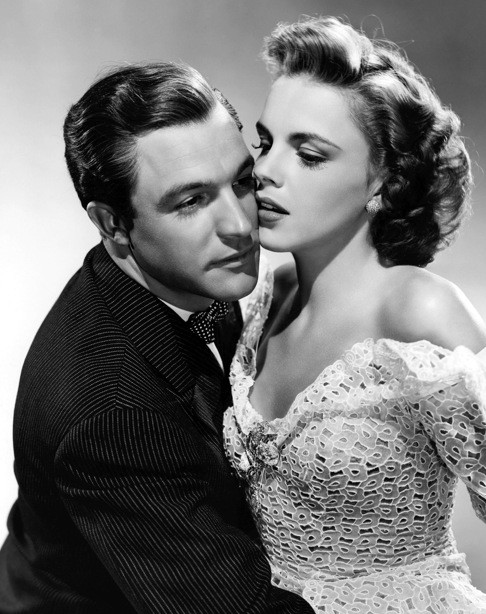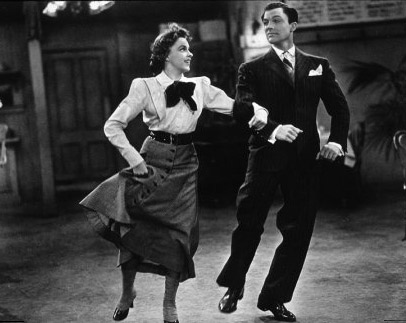Judy Fest: "For Me and My Gal"
 Thursday, August 4, 2011 at 9:59AM
Thursday, August 4, 2011 at 9:59AM  Bless the Walter Reade theater and The Film Society of Lincoln Center. This summer has been so trying in so many ways, but the Judy Garland retrospective is bliss. It helps that the Walter Reade is such a great place to see older films what with great air conditioning, comfortable seats and a big screen. The same can't (unfortunately) be said for the other prime NYC HQ for cinephiles (Film Forum). Anyway, people often think of Judy as an icon of tragic catharsis: heartbreak voice, trembling gesture, short life... but then you see the movies and she's just got charm for miles, a full range from light touch to direct hit, and she's funny and dazzling. Watching her proves far more joyous than tearful though sometimes the two come together.
Bless the Walter Reade theater and The Film Society of Lincoln Center. This summer has been so trying in so many ways, but the Judy Garland retrospective is bliss. It helps that the Walter Reade is such a great place to see older films what with great air conditioning, comfortable seats and a big screen. The same can't (unfortunately) be said for the other prime NYC HQ for cinephiles (Film Forum). Anyway, people often think of Judy as an icon of tragic catharsis: heartbreak voice, trembling gesture, short life... but then you see the movies and she's just got charm for miles, a full range from light touch to direct hit, and she's funny and dazzling. Watching her proves far more joyous than tearful though sometimes the two come together.
I caught two consecutive features earlier this week from the brief moment between her ascendance (Dorothy Gale + all those Mickey Rooney pictures) and adult superstardom (Meet Me In St. Louis). Both pictures were made around her 20th year, as she left teen stardom behind.
For Me and My Gal (1942)
This was the first of Judy Garland's three pairings with Gene Kelly (and his film debut!) and the first picture where she alone was billed above the title, indicating Hollywood's new confidence in her bankability. It's a period piece with Gene & Judy playing low rent vaudeville act "Palmer & Hayden". They're attempting to up their game and become headliners at the Palace (New York) just as Judy's brother and all able bodied young men are being shipped off to World War I. Palmer (Kelly) doesn't want to go when the draft hits him and this relentless career drive looks like cowardice and lack of patriotism to everyone including Hayden (Garland).
 Two of the movie musical's greatest bond over song and dance. It's a little bit like that famous scene in ONCE (2007) actually, a kindred spirit discovered at the piano.
Two of the movie musical's greatest bond over song and dance. It's a little bit like that famous scene in ONCE (2007) actually, a kindred spirit discovered at the piano.
The film peaks quite early with the title song, a thrilling example of what modern musicals are always forgetting: songs are supposed to move the story along! "For Me and My Gal" was an old standard at the time -- this is essentially a jukebox musical like Singin' in the Rain -- but it's used as a plot device, the performance of which, falsely casual over coffee, is a sneaky ploy by loveable cad Palmer (Kelly) to win innocent Hayden (Kelly) away from her current act.
As anyone who's ever seen Kelly & Garland perform together knows, they're a match. The ploy will work. That swoony soft tenor of Kelly's, the aural equivalent of a randy comfortable blanket for vocal partners to take to their beds, just nuzzles right up to her more powerful alto, and let's it do the heavier breathing while he moves. And oh how he moves. John Fricke, noted Garland historian, was on hand to introduce the film and he shared that Kelly credited Judy with teaching him how to act for the camera. He didn't yet know how subtly you can play for the camera as opposed to the stage (Before this film he'd become a Broadway sensation in "Pal Joey" and Garland lobbied to hand him this debut.). You can see Kelly's learning curve in this film but as a song and dance man, he just can't be beat.
I amend. The film peaks a little later than that, when Judy sings "After You're Gone" which would become a concert staple for her (see below).
You can chalk up the song's staying power to the weird combo of its fickle tempo changes and Garland's unfaltering emotional control of its content. The film version of this number (I couldn't find a good video), takes place in a improvisational hurry because Kelly has been seeing another woman (Márta Eggerth -- more on her in the next post) and is late to their performance. Garland is essentially selling the song AND three separate character and plot points within its ebbs and crescendos: Hayden's ascendance into a confident entertainer who is able to leave her personal drama offstage, a young girl's immediate and unruly love for a man who is clearly trouble, and a maturing woman's worry about their future as partners. The song is prophecy, future tense, but Garland manages to sell her character's past, immediate present and future depending on the note.
Amazing.
The film's second half -- once we arrive at draft dodging and war bond selling patriotism and even an actual grenade throwing war sequence, is weirdly ungainly and choppy. But the film is definitely worth seeing as a milestone in three of the greatest careers within cinema's musical genre: Garland's, Kelly's, and director Busby Berkeley who considered For Me and My Gal his best film. (People aren't always the best judges of their own work but that's still something.
For Me and My Gal (first half: B+; second half: B-)
As exit music, why not Gene Kelly dueting with wee Liza on the title track years and years after her mama's movie hit it big?
Isn't that sweet?
Next up... the other film from this time period, with some interesting similarities Presenting Lily Mars (1943)


